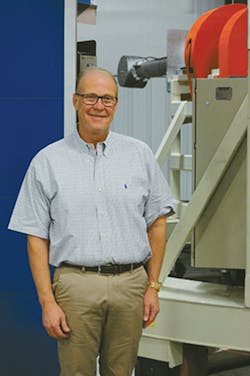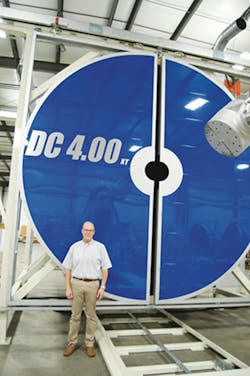
From his start at a knife business, Bob Sly began carving out a place for himself in the plastics industry, moving first to fill a need for pulverizers, then entering the rotomolding business. He is the founder of several companies, including Reduction Engineering and Rotoline USA. With more than two decades in the industry, he's had a stake in companies on four continents in a number of segments, including recycling and resin manufacturing. The 57-year-old father of five, though, has scaled back since the death of his wife in 2013. Some of his children now work in the plastics industry and he says the positive impact he's had on families brings him satisfaction. He recently spoke with Plastics Machinery Magazine correspondent Lisa Jo Lupo.
Throughout your plastics career, you founded a number of companies. How did you get started?
Sly: I was working for a company in Akron, Ohio, in the industrial knife business, but things weren't going so well, so I decided to try to start my own business. In 1992, I founded Accu-Grind in Kent, Ohio, an industrial knife company. We manufactured cutting tools for grinding plastics and bought and sold industrial knives and sharpeners. We also were doing some work for Step2 when my contact there said, "I wish I knew somebody who knew how to make pulverizing machines." Seeing an opportunity, I started Reduction Engineering.
At the beginning, Reduction Engineering was 60 percent rotational molding and PVC recycling equipment. But as we grew, we made all sorts of different products for the compounding industry, rotational molding and resin businesses. We manufactured pulverizers, pelletizers and downstream equipment for resin suppliers, raw-resin manufacturing and recyclers. In doing so, we developed some new technologies for our machines, including a horizontal milling pulverizer; eventually, we took our patented technologies to market for rotational molding.
We then expanded the company through acquisitions. We bought out our competitor, Scheer, in Stuttgart, Germany, then absorbed Scheer in Taiwan and China. We had a company in Massachusetts, Accu-Grind of New England, and I participated in the acquisition of Novatec in Baltimore. At one time, I had seven companies with seven facilities around the world.
And then, in 2015, you sold Reduction Engineering to Dover Corp., the parent of Maag. Why?
Sly: I have always done quite a bit of traveling for my companies — I used to travel over 200,000 miles a year. But three and a half years ago, my wife, Patricia, died from pancreatic cancer. We still had kids at home, so I had to make some adjustments. Life had to change. Maag Group had long been a competitor, so the sale made sense. Now, I am a co-owner of Rotoline with two facilities — the headquarters in Brazil and our facility in Kent, Ohio; I founded Atlanta Rotomolding in Decatur, Ga., in 2004, as a place to show the machinery in action.
So, Atlanta Rotomolding manufactures plastics products using the Rotoline equipment — from commercial containers to kayaks to hunting decoys and custom builds. It has always been more of a $1 million to $2 million company, but we just recently received a $100 million molding contract, so we've got some growing to do!
You lived in Brazil when you were young. Was that how the partnership with Rotoline came about?
Sly: Not really. My father was transferred to Brazil when I was a teenager, so I went through high school in Brazil and learned the language. Later, in my travels with Reduction Engineering, I met Luccas [Washington DeLuccas], who is from Brazil and co-owned Rotoline. We clicked instantly — we've been together now for 22 years, we just think alike, and I love having the opportunity to speak the language and go back to Brazil. I really enjoy the people there. They are incredible; they have drive. So, I started representing Rotoline for the U.S. through Reduction Engineering and eventually started Rotoline USA.
At the Kent facility, we don't manufacture the machinery; we do the assembly. The heavy manufacturing is all done in Brazil and shipped here, where we then provide some U.S.-made, value-added parts and customization. So, it's an in-and-out process with the machines: We set them up, test them and ship them out. But we always have machines in stock, mostly for display and running of small test runs. Companies will come in and we will run a part for them to see how it runs.
What do you see as the basis of the success of your companies and of your machines?
Sly: Rotomolding has always been a very manual business. You need people to put in the powder and take out the parts; it's very labor intensive. Luccas and his team developed an automated method, so our machines take a lot of the human labor out of it and enable part production at a lower cost and in about the same amount of time as blowmolding — which is our greatest competition. But rotomolding provides a more even wall thickness and more strength in the corners than blowmolding.
We have shuttle and carousel machines, both of which are biaxial rotation, so when the plastic powder is put in, the arm spins and turns at the same time to evenly coat the walls of the mold as it is rotated. The carousel machine has a central axis where the arms move in a circular way throughout the five stations of the process: oven, over cure/pre-cooling, cooling, loading/unloading and standby. The shuttle machines have two cars, so one can be in the oven and one out cooling.
What also makes our machines different is the efficiency of the oven. It is round, so the airflow is very even, with the heat running evenly across the mold surface. In rotational molding, you have to be careful with cooling because you can get warpage, but our cooling chamber enables us to precisely control that. We also have an excellent software package, and every time we sell a machine we go out to the customer's facility to set it up, test it, then provide ongoing support.
You've said you still have kids at home. Do, or will, any of them work with the business?
Sly: I have five children. My oldest, John, stayed with Reduction Engineering when it was sold, so he now works for Maag. My second, Lauren, and her husband, Matt Jeffries, run the Atlanta Rotomolding operation, where my son, Robby, also works. My daughter, Allison, just graduated from college in early-childhood education, and my youngest, Jack, is in high school. Luccas' son and daughter also work for the company in Brazil.
What would you like your industry legacy to be? How do you want to be remembered?
Sly: I've been in the industry for about 25-30 years. I'd like to be remembered for all the help I've offered to numerous different businesses and customers by developing better and more efficient ways to process plastic. I feel the greatest asset of any company is your people, and I enjoy seeing people's lives get better and their families' lives enriched by their jobs. So, I'd like to be remembered for having created a healthy, growing environment for people to succeed in.


